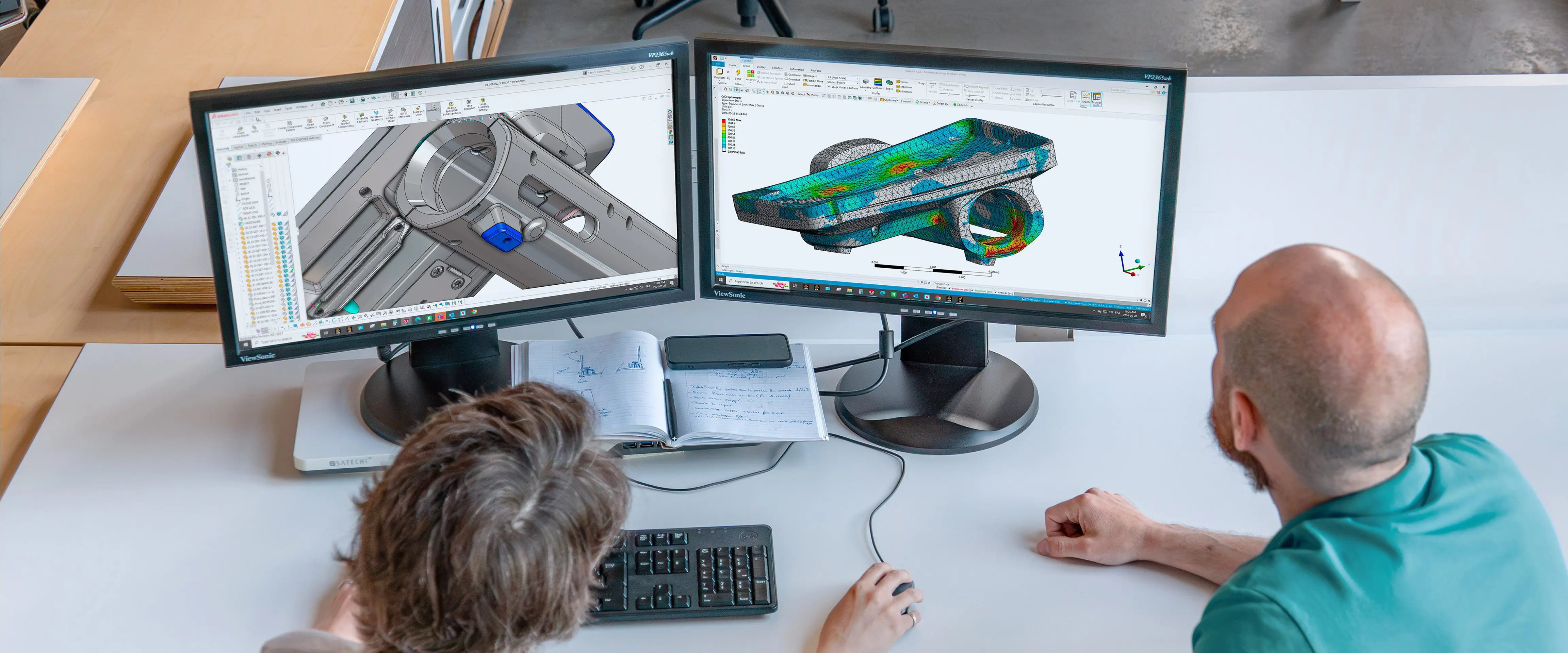Engineering Design and Mechanical Analysis
EDUCATION > About > Engineering Design and Mechanical Analysis

Engineering Design and Mechanical Analysis
The Engineering Design and Mechanical Analysis study program offers students a comprehensive experience in the latest technologies and trends driving innovation in today’s engineering environment.
At the undergraduate and graduate levels, students who enroll in Engineering Design and Mechanical Analysis gain key skills in developing complex technical systems and conducting advanced mechanical analyses. Our goal is to provide students with a solid foundation in engineering design and analysis, along with top-tier expertise tailored to the challenges of the modern world. Graduates of our program are prepared to contribute to industries such as machinery and device development, automotive engineering, aerospace, medical technology, and sustainable engineering.
Undergraduate Specialization (2 semesters)
As part of the Mechanical Engineering program, this one-year specialization gives students insight into the fundamental and applied skills for designing complex engineering systems and analyzing mechanical performance.
Students will master key concepts such as:
- Product Development – Understanding the development process from the engineering concept to the final product.
- Computer-Aided Design (CAD) – Using advanced software tools to create and optimize design and product models.
- Automation and Machine Elements – Designing automated systems and mechanical components with a focus on efficiency.
- Strength of Structures – Analyzing the integrity and durability of structures subjected to various loads.
- Experimental Mechanics – Gaining practical experience in testing and evaluating the mechanical performance of structures.
- Finite Element Methods (FEM) – Applying mathematical tools to simulate and solve mechanical problems.
- Vibration Control – Understanding and managing mechanical vibrations to ensure structural stability and performance.
The specialization offers students practical skills in design, preparing them for real-world challenges and providing a strong foundation for further education or work in the field of mechanical engineering.
Graduate Program (2 years, 4 semesters)
The graduate program is designed to educate industry-ready professionals, equipped to tackle the challenges of modern engineering in developing complex technical systems. With a focus on interdisciplinary problem-solving, innovation, and hands-on learning, we offer three attractive specializations:
Product Design and Development
This specialization enables students to leverage advanced engineering informatics and artificial intelligence for the development of future products. Core areas include:
-
- AI- and Data-Driven Design: Learn how artificial intelligence transforms product development, enabling faster and more efficient design processes.
- Robotics and Actuators: Dive into the creation of intelligent robotics and electromechanical systems, including robotic components and electric drive systems.
- Lightweight Structures and Sustainability: Master the design of lightweight and eco-friendly structures using state-of-the-art simulation and optimization techniques.
- Engineering Management: Manage the integration of innovative technologies and methodologies into the development process, ensuring efficient workflows, resource allocation, and teamwork.
Structural Analysis
Focus on mastering the mechanical properties and behavior of materials and systems through the latest simulation techniques and dynamic analysis tools. Core areas include:
-
- Applied Finite Element Methods (FEM): Explore the capabilities of FEM to analyze complex structures and ensure optimal performance.
- Vibration Control and Stability: Learn to diagnose and mitigate mechanical vibrations to improve the safety and efficiency of mechanical systems.
- Limit Analysis, Monitoring, and Structural Integrity: Gain expertise in predicting and controlling the dynamic behavior of machines and structures.
Medical Design
This specialization equips students with unique interdisciplinary skills at the intersection of engineering and medicine. Core areas include:
-
- Biomechanics of Human Movement: Study the mechanics of human movement to design advanced prosthetics, implants, and assistive devices.
- Biomaterials and Tissue Engineering: Understand the materials and methods used to design medical devices that seamlessly interact with biological tissues.
- Medical Robotics and Biological Fluid Dynamics: Gain practical experience in designing cutting-edge medical robotics and analyzing biological flows for applications such as artificial organs and medical diagnostics.
Elective Courses – Customize Your Educational Path
A wide selection of elective courses allows students to further specialize and explore the frontiers of modern engineering:
- Sustainable Development: Learn how to integrate sustainable practices into every stage of product development.
- Robots and Manipulators: Dive into advanced robotic systems and explore their applications in industries such as manufacturing and healthcare.
- Design for Additive Manufacturing: Understand the use of additive manufacturing for faster and more flexible production processes.
- Numerical Simulation of Dynamic Systems: Use state-of-the-art tools to simulate complex dynamic systems and optimize their performance.
State-of-the-Art Facilities and Real Engineering Challenges
- Laboratory for Engineering Design - CADLab
- Machine Assembly Laboratory
- Machine Elements Laboratory
- Numerical Mechanics Laboratory
- Experimental Mechanics Laboratory
- Machine Dynamics and Mechanism Theory Laboratory
Enroll in Engineering Design and Mechanical Analysis and become part of the new generation of innovative engineers!




